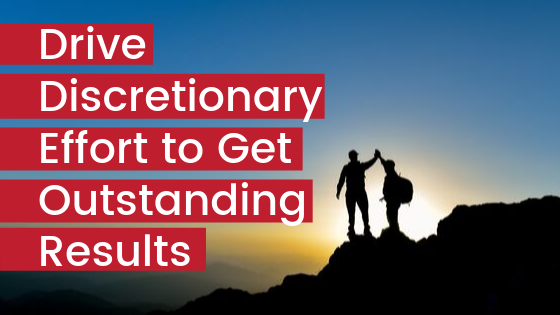Last week I talked about the ROI of safety culture. In addition to the stats, what you can also gain from having an excellent safety culture is something less measurable, but undeniably valuable, and that is discretionary effort.
Discretionary effort is defined as “the level of effort people could give if they wanted to, but above and beyond the minimum required.” (Aubrey C. Daniels, Ph.D). “Many organisations manage performance in such a way that motivates employees to do only enough to get by and avoid getting in trouble (negative reinforcement).”
By investing in creating the conditions and motivation for your teams to give discretionary effort, you’ll find that it pays off in productivity, morale and safety.
To achieve this, however, it requires effort and consistency in specific areas. Some essential factors to ensure you cover if you want to achieve discretionary effort within your teams are:
Vision
People need to know the overall vision within the company and within their site before they will be willing to offer any discretionary effort. It can be easy to forget this and to assume that at the operational level, they don’t need to be informed.
Bringing into this vision needs to be your vision of safety, and when everyone knows this, they will be invested to keep safety front of mind.
Respect
Respect comes before trust. When people know that their expertise and contribution is respected, they feel valued and recognised.
This isn’t about personality, it’s about recognising what someone brings to the team and company as a whole.
Control
When people have the perception that they have control over their input and their role, they work better and safer. This comes down to the environment you create – are you consciously creating an environment that avoids stress, but that still includes pressure? The big difference is that control factor.
A simple way to create control within a team environment is to give them a say.
I wrote about giving people a platform in this blog on 3 Essential Leadership Practices.
Camaraderie
Peers and camaraderie are the number 1 reason employees go the extra mile – this study outlines 7 Key Trends Impacting Today’s Workplace.
As they outline in their report: “While diving deeper into the causes of employee dissatisfaction, we also uncovered significant opportunities to turn the tides. In particular, organizations that focus on organic, peer-to-peer recognition and collaborative work environments set a foundation for high employee engagement. Organizations that intentionally create an environment of recognition and regularly solicit and act on employee feedback enjoy a significant competitive advantage over organizations that think of employees as cogs. It’s time to ask employees what they need and want—you can be assured your competitors will.”
Within safety – this is critical. It’s very simple – the closer a team are, the more they will proactively look out for each other.
If you’re in any doubt about the value of discretionary effort, it can help to think of a sports team at the top of their game. The players won’t hesitate to put in the extra training or commitment because they are part of something special, and more often than not, the results pay off.
The beauty is that none of the above costs anything but a bit of consistent effort and commitment, yet the return can be immense.
If you want to learn more about unlocking the discretionary effort in your worksite, give Deborah Keep a call on 0420 204 982 or email deborah@deborahkeep.com.

